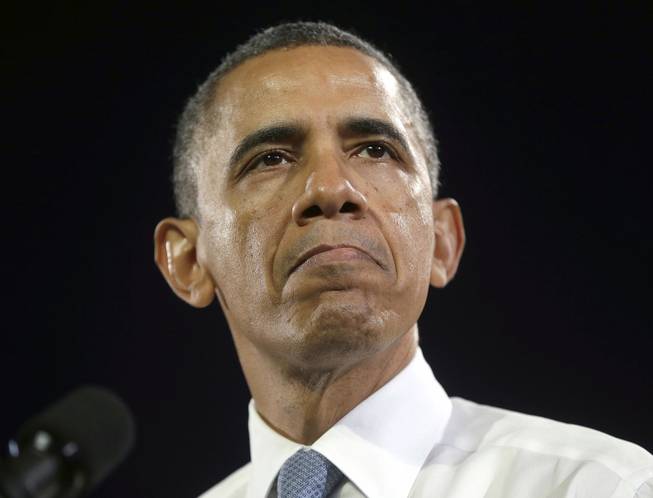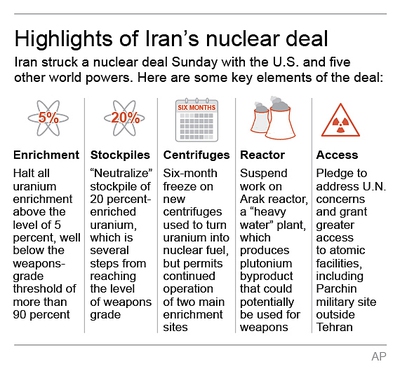
ASSOCIATED PRESS
President Barack Obama pauses as he speaks about immigration reform, Monday, Nov. 25, 2013, at the Betty Ann Ong Chinese Recreation Center in San Francisco.
Tuesday, Nov. 26, 2013 | 2 a.m.
Sun coverage
At best, the White House’s recent deal to restrain nuclear capabilities in Iran has the cautious support of some Democrats in Nevada’s congressional delegation, while Silver State Republicans are ripping it as a softball move that could carry serious consequences.
“In the end, I believe that this deal is wrought with risk,” Nevada Republican Sen. Dean Heller said Monday, adding that the agreement prompts “the question of whether this deal brings Iran closer or further away from obtaining nuclear weapon capabilities.”
President Barack Obama announced late Saturday that the United States, along with France, the United Kingdom, Russia, China and Germany, struck an agreement with Iran to dilute its stockpile of enriched uranium and scale back both the centrifuges and reactors it uses to purify fissile materials. In exchange, the U.S. agreed not to impose any new sanctions for at least six months.
Congress had no role in the deal, and Obama said lawmakers could easily sour it up by insisting on squeezing Iran with sanctions that could “derail this promising first step.”
The Senate is expected to debate Iran sanctions in December; the House of Representatives already voted in July to step up sanctions on Iran, with all four members of Nevada’s House delegation on board.
With the exception of Rep. Steven Horsford, D-Nev., those members doubled down on their insistence for tighter sanctions Monday, even in the face of a new deal.
“While I support diplomatic efforts to reach a peaceful agreement … we must continue to vigorously enforce strong sanctions,” said Rep. Dina Titus, D-Nev., noting that she had supported additional sanctions in the House and hopes the Senate "will move quickly to consider those sanctions.”
Rep. Joe Heck, R-Nev., said: “Easing sanctions on Iran when they are finally starting to make an impact while not actually ending Iran's uranium enrichment program is a bad deal for the United States and our allies. This deal does little to deter Iran from developing the capability to produce a nuclear weapon and could jeopardize the stability of the region.”
Horsford, despite his earlier vote to stiffen sanctions, seemed willing to give the White House time to prove the strength of its deal Monday.
“This a six-month interim plan, and Iran needs to demonstrate that they are serious about ending their nuclear enrichment program,” he said. “It is critical that the United States and our allies work together during this interim period to hold all sides accountable to the terms of the agreement. Otherwise, more severe economic sanctions will be required."
In the Senate, the president may have similar cover in the guise of Nevada’s Harry Reid, the majority leader. But just days before the deal, he professed that he would “support a bill that would broaden the scope of our current petroleum sanctions, place limitations on trade with strategic sectors of the Iranian economy that support its nuclear ambitions, as well as pursue those who divert goods to Iran.”
On NPR’s "Diane Rehm Show" on Monday, Reid repeated a promise first made last week that he would start a debate on Iran.
In the radio interview, he allowed himself some wiggle room, saying he would defer at least some of the sanctions review process to the heads of the Senate Intelligence, Foreign Relations and Banking committees.
“They will study this, they will hold hearings if necessary, and if we need work on this, if we need stronger sanctions, I am sure we will do that,” Reid said, noting that he would consult with Democrats and Republicans when Congress returns to Washington on Dec. 9 and then “move forward appropriately.”
But not all of those committee chairs agree on the best way forward.
Sen. Dianne Feinstein, who heads up the Senate Intelligence Committee, spoke out in strong support of the Iran deal, calling it a “giant step forward that should not be undermined by additional sanctions at this time.”
But Sen. Bob Menendez, D-N.J., chairman of the Senate Foreign Relations Committee, has not let up on his push for tougher sanctions, telling Roll Call on Sunday that, deal or no deal, the Senate should move such a bill now.
“I expect that the forthcoming sanctions legislation to be considered by the Senate will provide for a six-month window to reach a final agreement before imposing new sanctions on Iran,” he told the publication. “But (it) will at the same time be immediately available, should the talks falter or Iran fail to implement or breach the interim agreement.”
While Congress talks, Reid is also having conversations at the international level.
He has already conferred about the Iran deal with both Obama – the deal’s biggest booster – and Israeli Prime Minister Benjamin Netanyahu, who derided it as a “historic mistake.”
Reid came away from those conversations saying he sympathized with Netanyahu while commending Obama.
“If I were the leader of (Israel), I would be concerned too,” Reid said on NPR. “But we all have to acknowledge that (the deal is) an important first step.
“Is a first step good enough? We will take a look at that.”


Join the Discussion:
Check this out for a full explanation of our conversion to the LiveFyre commenting system and instructions on how to sign up for an account.
Full comments policy